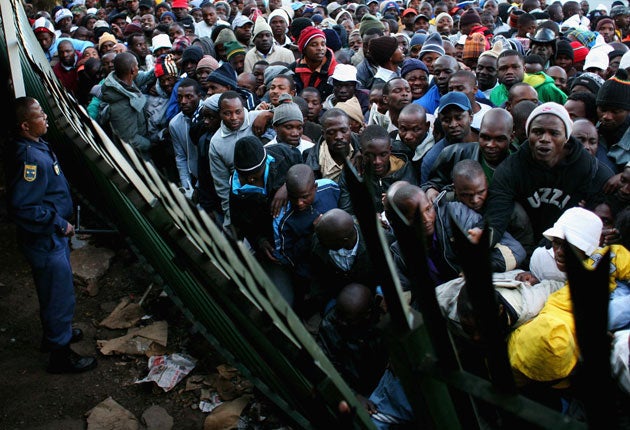Britain closes door on 80,000 asylum-seekers
Ministers accused of double standards after listing 'countries of concern'

Your support helps us to tell the story
From reproductive rights to climate change to Big Tech, The Independent is on the ground when the story is developing. Whether it's investigating the financials of Elon Musk's pro-Trump PAC or producing our latest documentary, 'The A Word', which shines a light on the American women fighting for reproductive rights, we know how important it is to parse out the facts from the messaging.
At such a critical moment in US history, we need reporters on the ground. Your donation allows us to keep sending journalists to speak to both sides of the story.
The Independent is trusted by Americans across the entire political spectrum. And unlike many other quality news outlets, we choose not to lock Americans out of our reporting and analysis with paywalls. We believe quality journalism should be available to everyone, paid for by those who can afford it.
Your support makes all the difference.Almost 80,000 asylum-seekers from countries described by theForeign Office as dangerous and unstable have been refused refuge in Britain in the past five years.
The Government was last night accused of double standards forregistering alarm about 21 "major countries of concern" at the same time as refusing sanctuary to 77,000 of their citizens who fled persecution and bloodshed. Refugees from turbulent nations such as Iraq, Afghanistan, Zimbabwe and Sudan are being turned down at the rate of nearly 40 a day, The Independent has learnt.
Since 2003, more than 5,000 refugees from Democratic Republic of Congo, which is facing humanitarian disaster, have been told by the immigration authorities to return home.
The Foreign Office's most recent human rights report listed 21 "major countries of concern" whose citizens suffered persecution and discrimination. Fifteen of them still have the death penalty.
The report warned of "widespread sectarian violence, lawlessness and violent insurgency" in Iraq, yet 13,131 Iraqi nationals have had applications for asylum in the UK turned down, including 1,090 last year and 520 in the first six months of this year. Enforced removals of rejected asylum-seekers have begun to the Kurdish-controlled north of the country.
A total of 10,060 Afghans – much of whose homeland is run by the Taliban and local warlords – have been refused asylum, as have 7,525 Zimbabweans. Although no Zimbabweans have been forcibly sent back since 2006, the Government is fighting legal action to allow forcible deportations to resume to the country.
Paul Holmes, the Liberal Democrats' justice spokesman, said yesterday: "This country has a proud record of providing refuge for people fleeing persecution but that tradition is being undermined. It is staggering so many asylum applications are being refused for people from countries the Government admits it is concerned about."
Mr Holmes added: "It is vital that Britain remains a beacon of freedom in a world of too many tyrants." A spokesman for the UK Border Agency said: "Britain has a proud tradition of offering refugee to those in genuine fear of persecution. However, when an independent judge decides a person does not need asylum, we expect them to return home. If they do not, we will enforce their removal. Last year we removed a person every eight minutes. Not everyone from countries where there is internal conflict needs our protection. Each case is judged on its individual merits."
But the Refugee Council's chief executive, Donna Covey, said: "These figures show just how tough our asylum system is. People claiming asylum struggle to get a fair hearing, despite coming from countries where human rights abuse is well-documented.
"This results in a growing number of people who are unable to return home as it is too dangerous, but who have no rights in the United Kingdom, so are left destitute, with an uncertain future, and unable to work and support themselves. This situation is unacceptable. The Government needs to take a more enlightened approach and offer people some sort of stability in the UK until it is safe for them to return."
Join our commenting forum
Join thought-provoking conversations, follow other Independent readers and see their replies
Comments